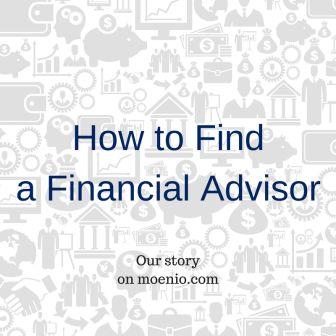 How do you find a financial advisor?
How do you find a financial advisor?
Not just an advisor but one of the best? A financial advisor delivering outstanding service and investment performance that matches your goals and need? This seems like a straightforward question but unfortunately, this has become a challenge for many people looking to find an advisor who can help with the investable assets. There are more than 600,000 financial advisors in the United States according to FINRA, the governing body regulating investment advisors. With so many investments advisors how do you, as someone looking to find an advisor or evaluate a current advisor, make certain you are working with one of the best?
In our thinking, we believe there is always a top 5% in any professional organization. Divorce attorney’s, there is a top 5%. Mechanics, there is also a top 5%. The best orthopedic surgeon, yep, a top 5%. But in these professions it is easier to find those performing at the highest levels. As to finding a divorce attorney, you can talk with friends who have had divorces or other professionals and the record speaks for itself. The divorce attorney has a clear and proven track record. For the mechanic, it’s almost as easy as driving by their place of business. If you see nicer cars stacked up outside the shop waiting for work then you can have some confidence they are one of the best.
With financial advisors finding the best can be quite the challenge and we’ll share the challenges we most often confront in our line of business.
How to Choose a Financial Advisor
1) Performance
 It is almost impossible to get a financial advisor to share their performance with you. In most cases the financial advisor will provide a “this is what we would do with your money today” presentation but that says nothing to the past performance. How do you make a decision without understanding past performance?
It is almost impossible to get a financial advisor to share their performance with you. In most cases the financial advisor will provide a “this is what we would do with your money today” presentation but that says nothing to the past performance. How do you make a decision without understanding past performance?
How do you know the advisor has done well with others money if they cannot provide some indication of the returns offered? It reminds me of a friend who hired a litigation attorney for a property dispute. Let’s share the ending – he lost. What happened was my friend asked a business partner, “who would you recommend?” His business partner had a friend who was an attorney and thought he could help. The challenge was his partner’s friend, the attorney, had a really poor track record of wins. Through a bit of digging you could see the attorney was great in some aspects of litigation but in this particular arena, he did not have much experience.
We see this happen all the time when clients hire us to help them find an advisor. The advisor they choose was someone who was recommended by a friend, family member or service professional (CPA/Attorney). The challenge for the client was not the referred advisor but understanding what questions to ask in uncovering, “How good of an advisor are you?” The client was not able to determine the historical performance of the advisor but they liked the advisor. Great person, good presentation and seemed to provide the right advice.
Fast forward a few years and the advisor underperformed costing the client money ultimately. And, you can’t blame the client. They were introduced by someone they trust it just turns out that most people, even those we believe are looking out for our best interest, have not done their own due diligence on the advisor.
We ran into this very situation but not from a client, from a CPA. The CPA had been referring two financial advisors for years. He liked them and felt they were doing a good job for his clients. In fact, he had not heard of any complaints. We were doing an “audit” on one of the advisors this particular CPA was referring. We meet the CPA by sending a request for tax information. Interestingly, fees paid to a financial advisor can potentially be tax deductible. In all our cases we ask the advisor, and sometimes the clients CPA, to provide this number to us. In this case the CPA did not have the information nor did the advisor have it readily available. To get to the point, we ended up talking with the CPA and during the conversation he asked, “So, how does my friend stack up as an advisor.”
One key point about our firm and what we do, our clients pay us. Therefore, our clients get our reports no one else receives this information except from the client. However, our response back was, “Why are you asking us, you are the one referring your clients to the advisor.” The morale of this short story made longer is that most of those referring business to you have never done the proper due diligence on those being referred and this is particularly noticeable with investment performance.
One important aspect and then we’ll move onto #2. You are hiring an advisor for one reason and one reason only – investment performance. Not to outperform the markets, beat the markets or find those secret stocks to buy. No, you find an advisor and then hire them to invest your money with your goals and risks in mind. You can underperform the markets a bit, as there is “risk” in the equation. But you certainly don’t want to underperform all the time or considerable underperform.
2) Fees
 We have one job for our clients – helping them find, evaluate or sit in meetings when making certain they have one of the best financial advisors – the top 5% for our clients. An area we find interesting to discuss revolves around fees and transparency. For us, we recognize financial advisors need to be paid a fair fee. A fee in-line with the work they do for their clients, which again, is managing assets and getting a nice, risk-adjusted return. This does not mean charging more because the investment advisor is doing more for their clients such as a financial plan, life insurance, bill pay, etc. Those are all value-added services the advisors want to provide so they have a stronger relationship with their clients.
We have one job for our clients – helping them find, evaluate or sit in meetings when making certain they have one of the best financial advisors – the top 5% for our clients. An area we find interesting to discuss revolves around fees and transparency. For us, we recognize financial advisors need to be paid a fair fee. A fee in-line with the work they do for their clients, which again, is managing assets and getting a nice, risk-adjusted return. This does not mean charging more because the investment advisor is doing more for their clients such as a financial plan, life insurance, bill pay, etc. Those are all value-added services the advisors want to provide so they have a stronger relationship with their clients.
What we want is a fair fee for fair services. The question becomes, “what is a fair investment fee to pay an advisor?” Unfortunately, I must use a quote here. Animal Farm – “All animals are equal, but some animals are more equal than others.” The more money you have the better fee you will be able to negotiate. As a rule of thumb, we do not feel any client should pay more than 1.00% for the management of their assets. When we look to find an advisor we always ask the advisor for the range of fees they are willing to charge. Typically the range goes from 0.75% to 1.50% but our goal is to get this range, depending on our client’s assets, from 0.45% to 1.00%.
As I mentioned, the other aspect is transparency. We want to clearly see the fees being charged rather than trying to decipher them from whatever the advisor chooses to provide. With this in mind, we always ask investment advisors to provide the format they’ll use to show us, “not tell us,” the total fees being paid at any time. For some firms they offer this in a simple printout done with performance reporting while other firms offer this through a separate report. Regardless of the format chosen, we want to see how fees are going to be shown thus giving us transparency from the initial conversations.
3) Fraud, Ponzi Schemes, and Bad Actors
Over the course of the past 10-years the number of financial advisors providing not bad advice but illegal services has grown.
- An advisor was fined and barred from the industry for making up clients and assets to potential clients in an attempt to gather more clients
- An advisor was convicted of fraud for stealing money from John Elway and a group of professional athletes (this has happened repeatedly to athletes over the past 20 years)
- An advisor was fined, barred, and then arrested for using client funds for personal use.
- An advisor was fined by FINRA for making up his college education and background.
- An advisor was fined and barred for the creation of “fake” performance reports.
And the list goes on.
Our first instinct is to believe what we see and hear however, our professional duty requires us to be different – “trust but verify.” One of our key priorities when trying to find the best financial advisor is to verify the advisors information in two key areas.
Questions to Ask and Verify about Your Financial Advisor
 1) Education and Work Background: does the advisor have an education and background consistent with giving sound advice and helping clients. If so, then how do we verify this information? We feel a key requirement on our part is to confirm the education and work background of our clients so we use an outside, independent firm to provide this information. We want to know the educational background of our clients. Where did they tell us they went to school and is it confirmed? We also want to confirm their work experience. This is one of the most overstated areas with professionals and having a clear understanding gives us insight into how trustworthy someone will be when finding an advisor.
1) Education and Work Background: does the advisor have an education and background consistent with giving sound advice and helping clients. If so, then how do we verify this information? We feel a key requirement on our part is to confirm the education and work background of our clients so we use an outside, independent firm to provide this information. We want to know the educational background of our clients. Where did they tell us they went to school and is it confirmed? We also want to confirm their work experience. This is one of the most overstated areas with professionals and having a clear understanding gives us insight into how trustworthy someone will be when finding an advisor.
2) Regulation and Criminal Background: it’s interesting that most “internal” resources for the financial advisor business direct consumers to utilize www.brokercheck.org. We agree 100% that this should be the first stop. In brokercheck, a consumer can find complaints, fines, some criminal records, some civil records and more. But, there is one glaring omission. Unless the advisors firm is doing a thorough background check on a yearly basis, brokercheck will not provide issues that have arisen since the original filing was done “if the advisor does not disclose it.”
What does this mean? Let’s say that an advisor goes through a bankruptcy. Based on industry rules the advisor is required to disclose this information. However, what happens if they do not? FINRA, who controls these reports, does not run a continual system of checks and balances so technically an advisor could “slip through the cracks” and could have done bad things. We don’t like that and we don’t want our clients to be left to the whims of someone who is a bad actor who is intentionally omitting information. Therefore we do a background check on all potential financial advisors when our clients hire us to find an advisor. Moenio is a client advocacy firmed focused exclusively on our
Let’s say that an advisor goes through a bankruptcy. Based on industry rules the advisor is required to disclose this information. However, what happens if they do not? FINRA, who controls these reports, does not run a continual system of checks and balances so technically an advisor could “slip through the cracks” and could have done bad things. We don’t like that and we don’t want our clients to be left to the whims of someone who is a bad actor who is intentionally omitting information. Therefore we do a background check on all potential financial advisors when our clients hire us to find an advisor.
Moenio is a client advocacy firmed focused exclusively on our clients needs when it relates to finding, evaluating or providing ongoing monitoring with their financial advisors, investment advisors and/or brokers. We feel there is absolutely a “best in class” and our mission is to guide our clients in find those advisors.
We do not manage assets We are not financial advisors Moenio does not accept compensation from advisors or their firms. We are paid exclusively by our clients creating a conflict free offering.

